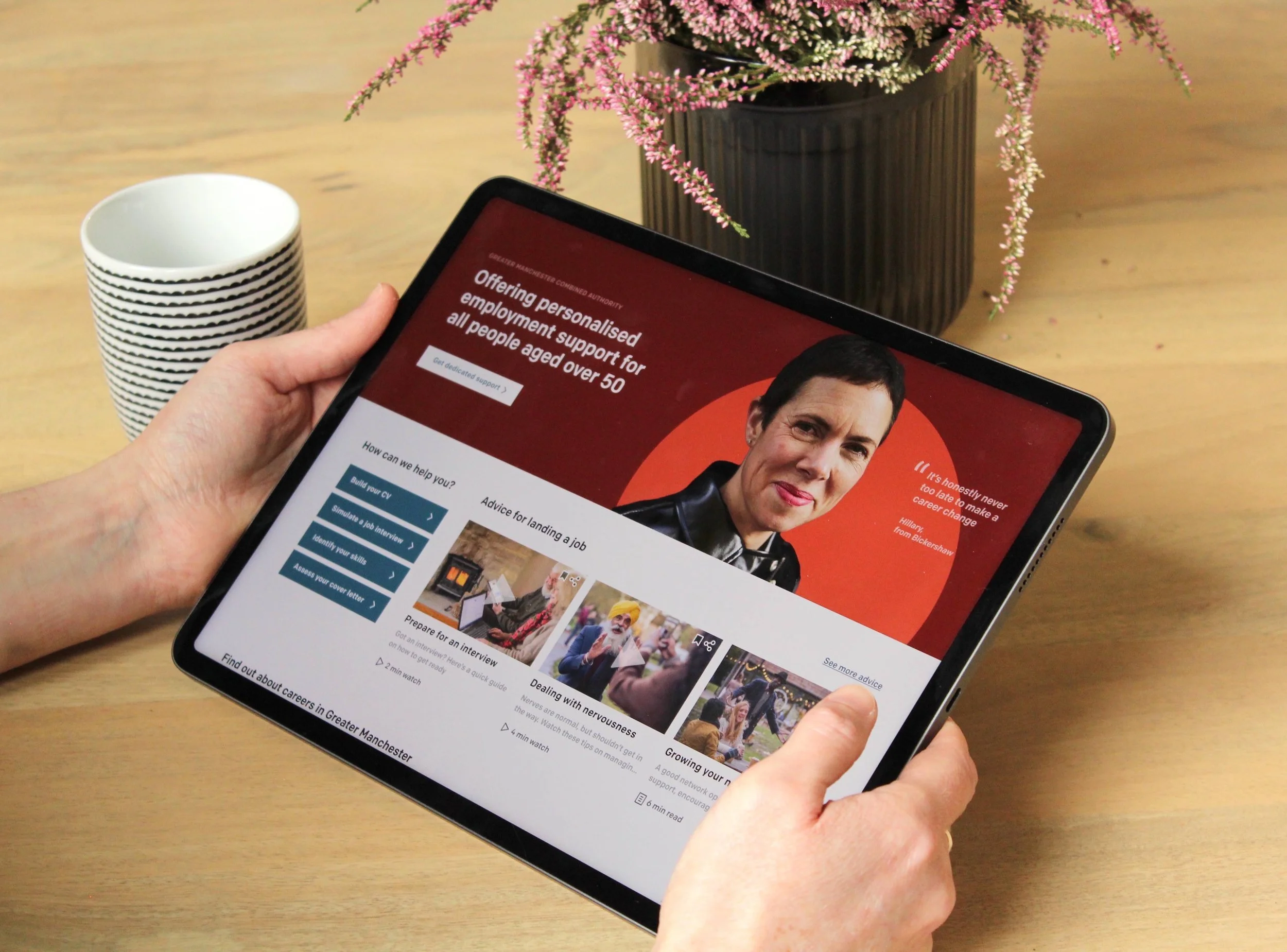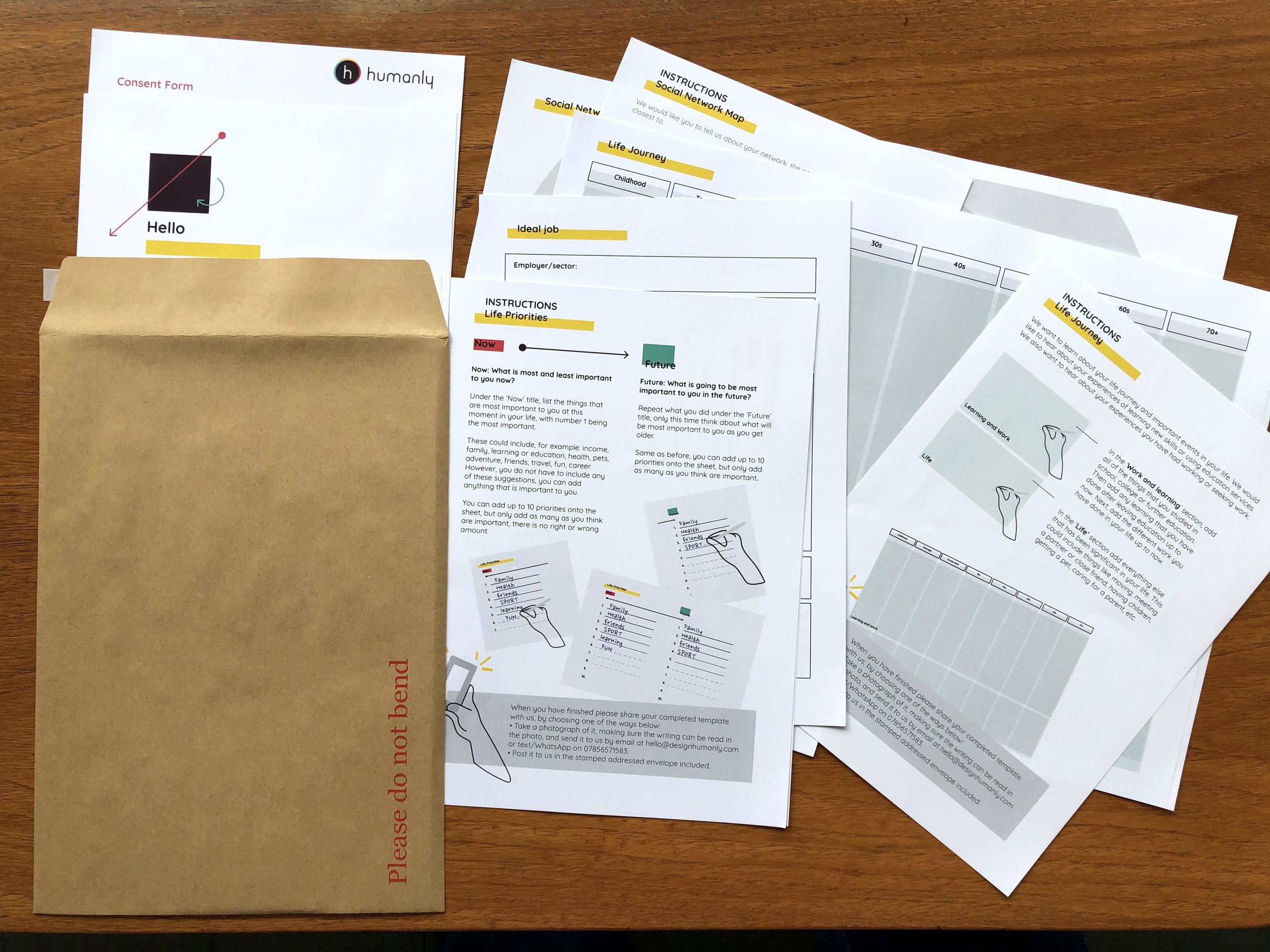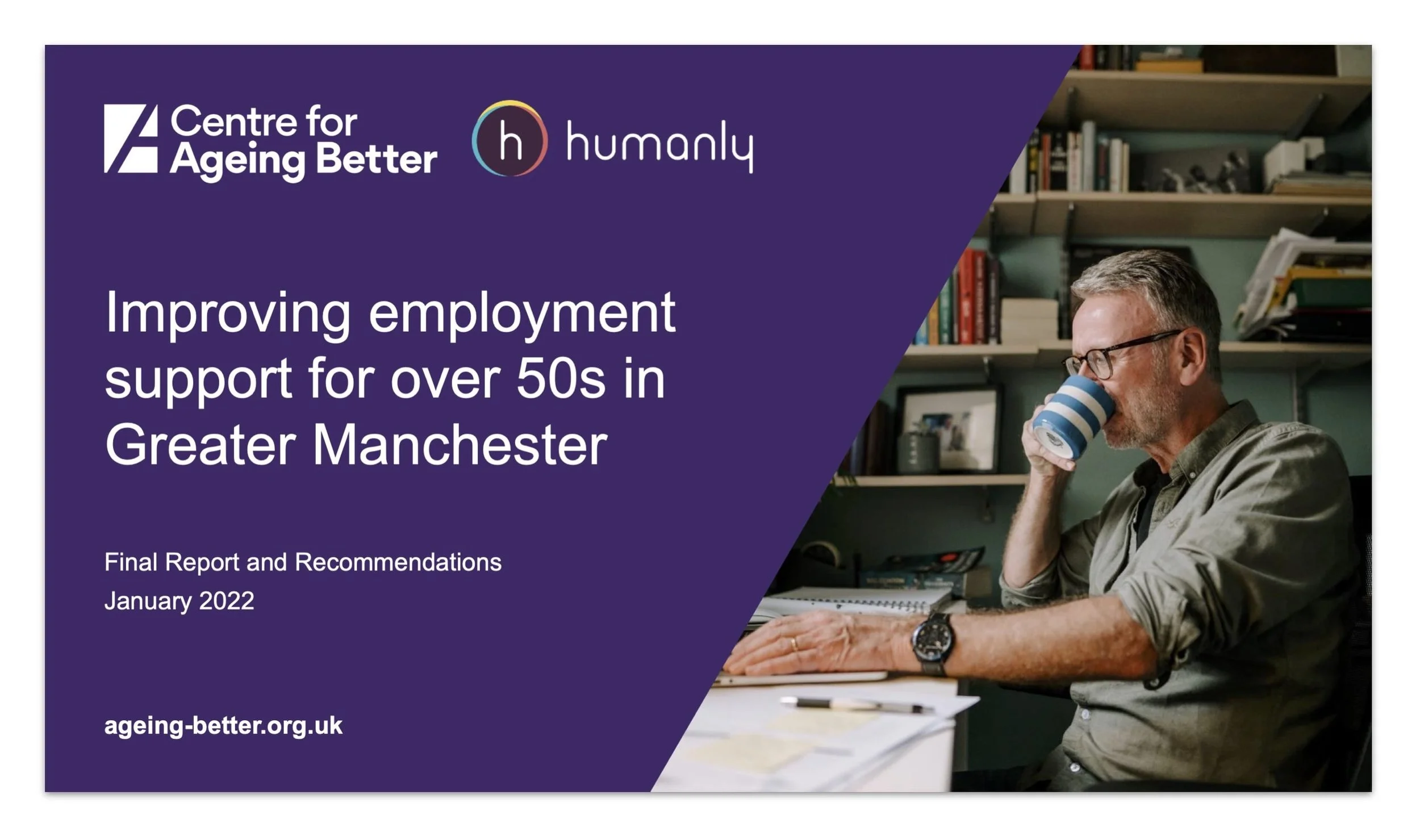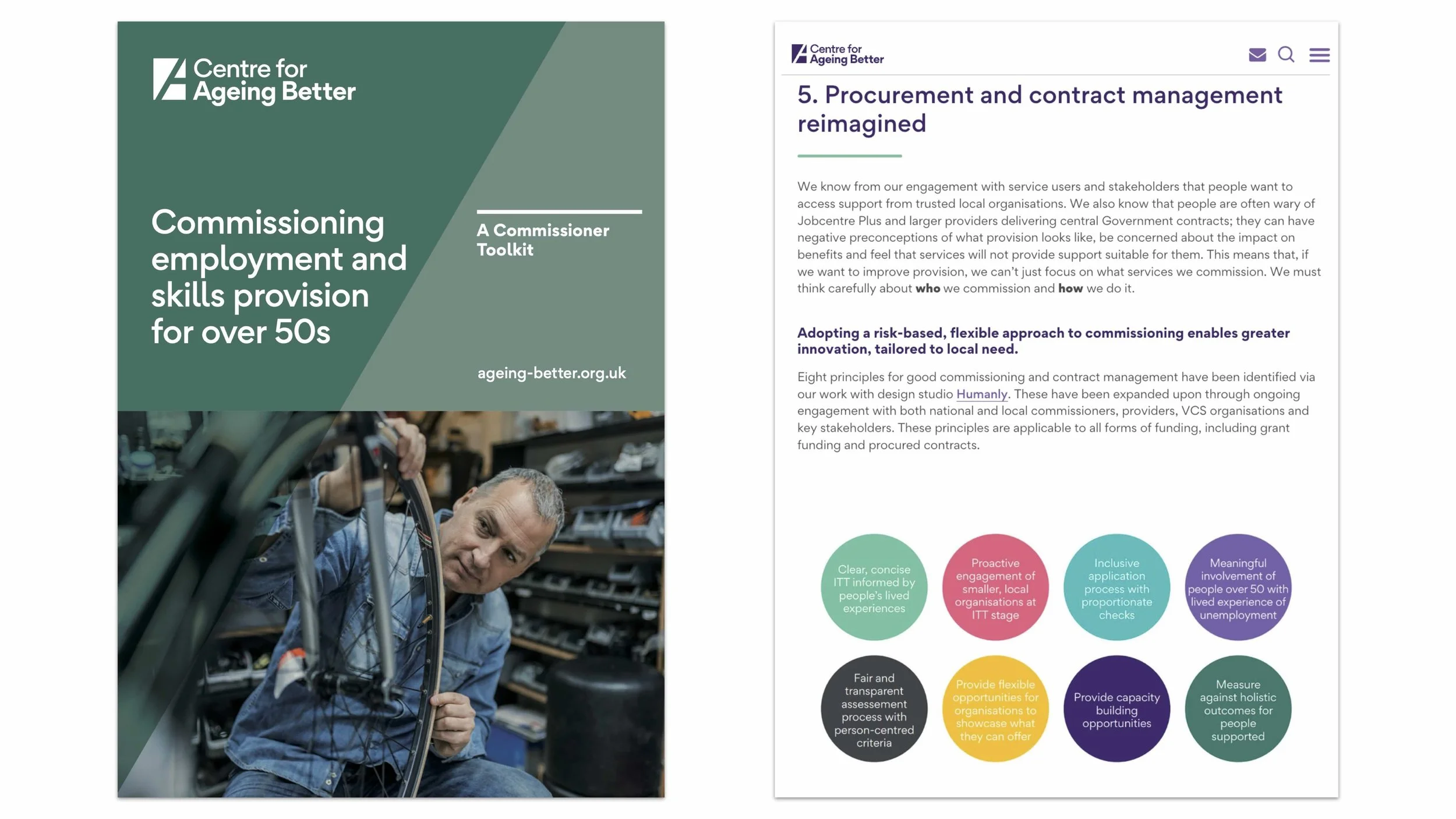Centre for Ageing Better | Developing new approaches to supporting people over 50 into work
Humanly led a participatory, iterative design process over 18 months to develop and prototype new approaches to supporting people aged over 50 into work in Greater Manchester.
The Centre for Ageing Better, Greater Manchester Combined Authority (GMCA) and the Department for Work and Pensions (DWP) are working in partnership with the joint aim of increasing the number of people aged over 50 in fulfilling work.
Humanly was brought in to lead the wider project team through a human-centred design process to understand users, challenge assumptions, redefine problems and create innovative solutions to prototype and test.
Humanly engaged over 200 people in this process, bringing a vast range of perspectives into the design process. This included over 90 people over the age of 48 with lived experience of being involuntarily out of work, as well as service providers, voluntary and community sector organisations, commissioners, employers and experts in labour markets, economics, procurement, coaching for people aged over 50, and more. Hilary Cottam provided advisory support to the Humanly team, bringing her wealth of experience in social innovation and insights from her work on the future of work.
The Process
Humanly facilitated remote co-creation and collaboration at scale, at a time when Covid-19 restrictions limited the amount of in-person work possible.
Humanly began by designing co-creation activities for people aged over 50, in order to uncover their lived experiences and ideas for what good support would look like. Humanly developed meaningful and inclusive engagement approaches, including a physical toolkit of creative activities that was posted to participants to complete in their own time. Bespoke templates were designed for mapping out people’s life journeys and job-seeking journeys; capturing people’s aspirations for their ideal life over 50; and generating ideas for ideal support.
Co-creation with people aged over 50 was complemented by extensive research into the existing system of employment support, including engagement with a wide range of stakeholders from across the system.
How might we change the way support is commissioned, procured and managed to foster innovation and person-centred support?
By examining the problem from all perspectives, Humanly established that the failure of current employment support to effectively meet the needs of people aged over 50 is symptomatic of the way that support is commissioned and monitored. It therefore became clear that this challenge must be tackled at multiple levels to effectively solve the problem.
Following a collaborative process of idea generation, concept development and refinement based on feedback from all stakeholders, four concepts were taken into the prototyping phase.
These concepts were prototyped at a range of fidelities to test their desirability, viability and feasibility. Through iterative rounds of testing, these were refined into two final concepts that were developed in detail.
The Solution
Humanly developed approaches to create the conditions for effective employment support to be delivered to people aged over 50, as well as a new service designed to meet the unique needs of this group.
Person-centred procurement
A reimagined version of the commissioning, procurement and contract management process was designed to foster local, person-centred support to help people in their journeys towards work. This process involves people with lived experience at all stages, and is designed to remove barriers for small, local organisations to bid for funding and deliver employment support.
Reach
A new service that supports people aged over 50 to reflect on their life experiences, and identify the transferable skills and qualities these have led them to develop. Reach actively recognises the value of broader life experiences, for example raising a family, caring responsibilities and volunteering in the community.
Reach inspires people to think differently about what they could do, with tailored suggestions for potential career paths that utilise labour market data to guide people towards sectors that are growing or sustainable.
The response from people aged over 50 was overwhelmingly positive, who emphasised the unique experience and support offered by Reach.
‘Just for someone like me isn’t it’
‘This is going to be a breath of fresh air and give a lot of opportunities to people who feel that they’re not valued in society’
‘I’d use it constantly.’
The Potential Impact
Reach offers unparalleled value for money by serving a large and underserved target user base and offering a highly feasible, cost-effective route to scale.
The service is designed to target people who are not accessing mainstream provision, and was found to be particularly useful for people who have been out of work for long periods of time. Humanly estimated that over 50,000 people aged over 50 in Greater Manchester who are involuntarily out of work could benefit from Reach.
The Outcomes
Humanly delivered detailed guidance and recommendations to support implementation.
This included a service blueprint, pilot plans, estimates of costs and user demand, a cost-benefit analysis, and key principles for successful implementation.
Over 1,000 people aged over 50 are due to be supported during an £8 million pilot over 18 months.
These exciting new approaches are now being implemented in Greater Manchester, with the ambition to have a wider influence nationally. A GMCA-commissioned £8 million employment support pilot includes a specialised offer for people aged over 50, based on the co-design work led by Humanly.
The project generated a huge amount of transferable learning and best practice, which has been widely shared to maximise the project’s impact.
The project was highlighted in the UK Shared Prosperity Fund prospectus as a case study of best practice.
Humanly’s final report has been published by the Centre for Ageing Better, enabling the project outputs to be freely accessed and replicated.
Case studies of the project have been presented at conferences and events including Service Design in Government, and can be watched online.
The project saw the development of innovative new approaches for inclusive remote engagement of people aged over 50, with wider applications to other groups, including digitally excluded people. These learnings were shared in a paper co-written by Humanly and the Centre for Ageing Better on ‘Remote engagement: Removing barriers to inclusion in the context of COVID-19’.
Humanly’s insights and ideas around reimagining commissioning, procurement and contract management were used to develop a Commissioner Toolkit launched by the Centre for Ageing Better.
Aimed at commissioners of employment and skills provision, this includes a set of eight guiding principles developed by Humanly, urging commissioners to adopt a risk-based, flexible approach to enable greater innovation, tailored to local need.






